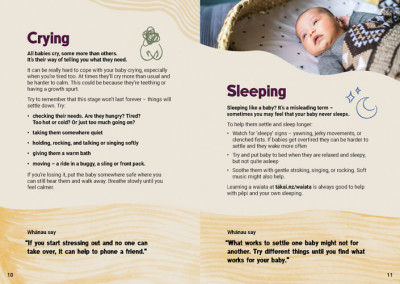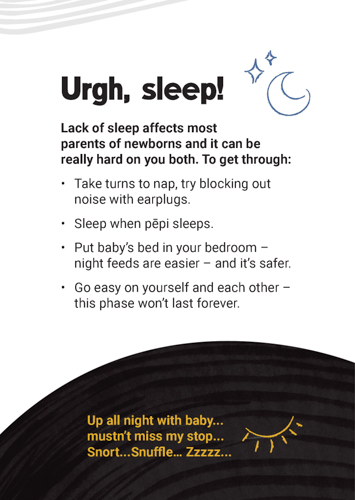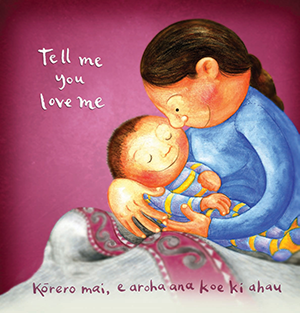
Sleeping like a baby
Some babies never seem to sleep. Parents can establish patterns that will help them and their pēpi.
The saying ‘sleeping like a baby’ can feel very misleading for some parents who struggle to get their baby to sleep – it may feel like their baby never sleeps!
Ask whānau:
- How has your family adjusted to having a new baby?
- Where does baby sleep?
- How are you managing changes to your sleep routines?
- Have you noticed if baby has their own sleep patterns?
- Have you established a routine to help settle baby?
In the booklet ‘Tips for babies’ (pages 12 and 13), it says: “What works to settle one baby might not for another. Try different things until you find what works for your baby.”
- Have you tried establishing any settling routines for pēpi? What are they?
- Have they been successful?
Establishing patterns
Patterns need to be set up, like all routines. Rocking, cuddling or feeding a baby may get them to sleep quicker, but they can often wake soon after they’re put into bed.
- How do you feel about feeding, rocking or cuddling baby to sleep?
- What patterns do you think you’ve been setting in place for baby?
- Have you identified your baby’s ‘tired’ signs? What are they?
- Do you have any other rituals that you use to settle baby to sleep? What are they?
Sleep tips from Plunket
The Plunket website has some more information about helping baby sleep in the first 6 weeks. Plunket suggests that parents:
- put baby down awake so their bed becomes a familiar place – especially when they’re showing ‘tired’ signs
- have a quiet time before bed with a cuddle, soothing talk or quiet singing
- keep baby warm in bed, but not too hot (one more layer than an adult would use is enough)
- relax baby by patting, stroking and talking to them quietly or by using a musical mobile
- stay with them while they go to sleep, or leave the room when they are calm but still awake.
Things to remember
- If baby starts to grizzle or cry when they’re put to bed, try gently stroking them. If they keep crying or seem distressed, pick them up, comfort them, feed them if they’re hungry, and then try putting them back to bed.
- The house doesn’t have to be silent – most babies will sleep through household noises, like a vacuum cleaner or music.
- If baby goes to sleep in their car seat, take them out of it when you get home. They can have breathing problems in a car seat if their head falls forward.
- Help baby learn the difference between night and day. Day feeds can be fun, with time to talk and cuddle. Night feeds are best kept quiet with dim lights and no playing or talking.
- Establish a regular routine before bed, like a bath, a massage, a feed and a quiet cuddle.
Average sleep times for babies
Every pēpi will have their own sleeping patterns, but it might help parents to know what the average expectation for a young baby’s sleep is:
- newborns: 16–20 hours per day, 3–4 periods of sleep
- 6 months old: 13–14 hours per day, 6–8 hours at night














